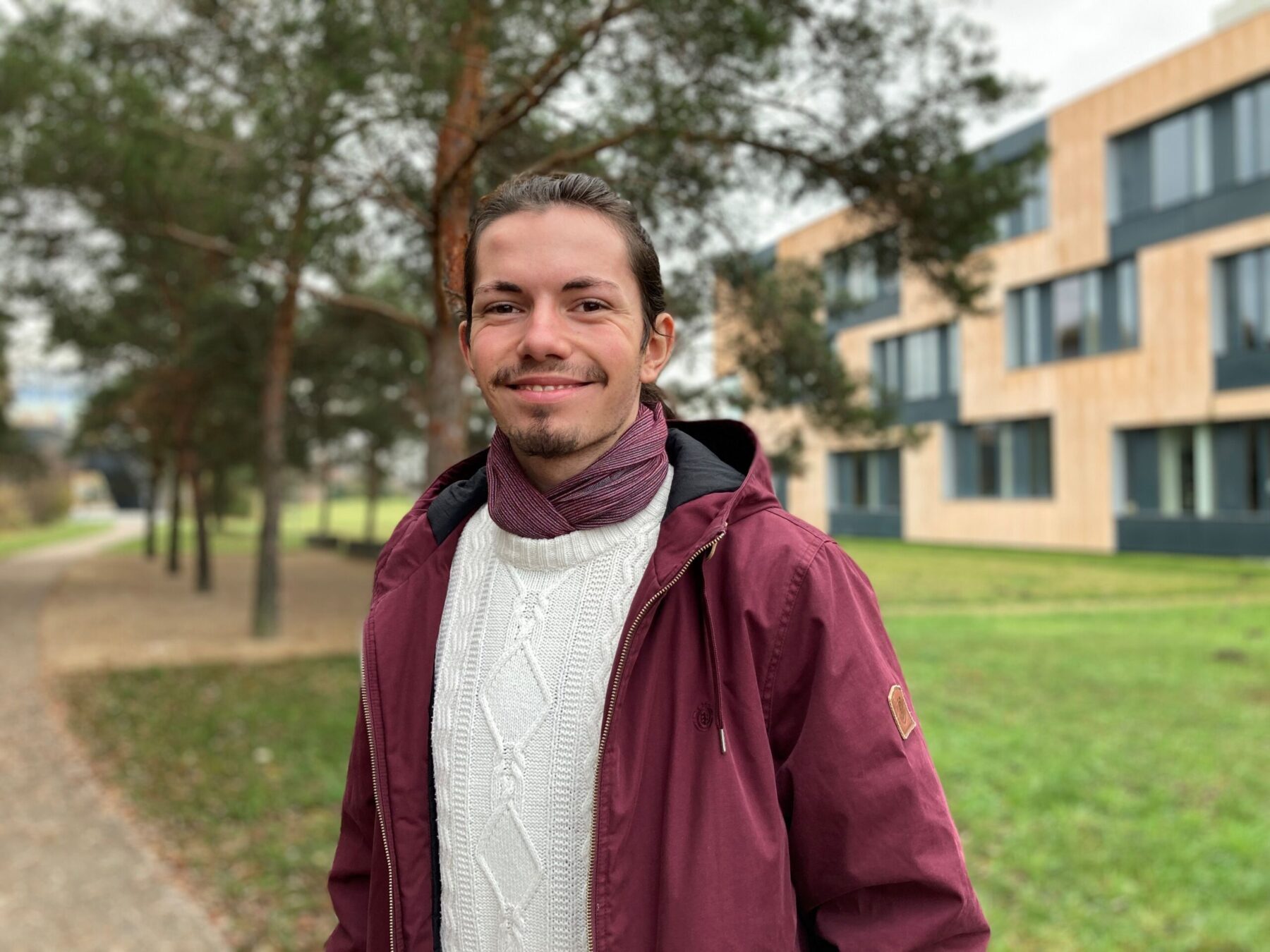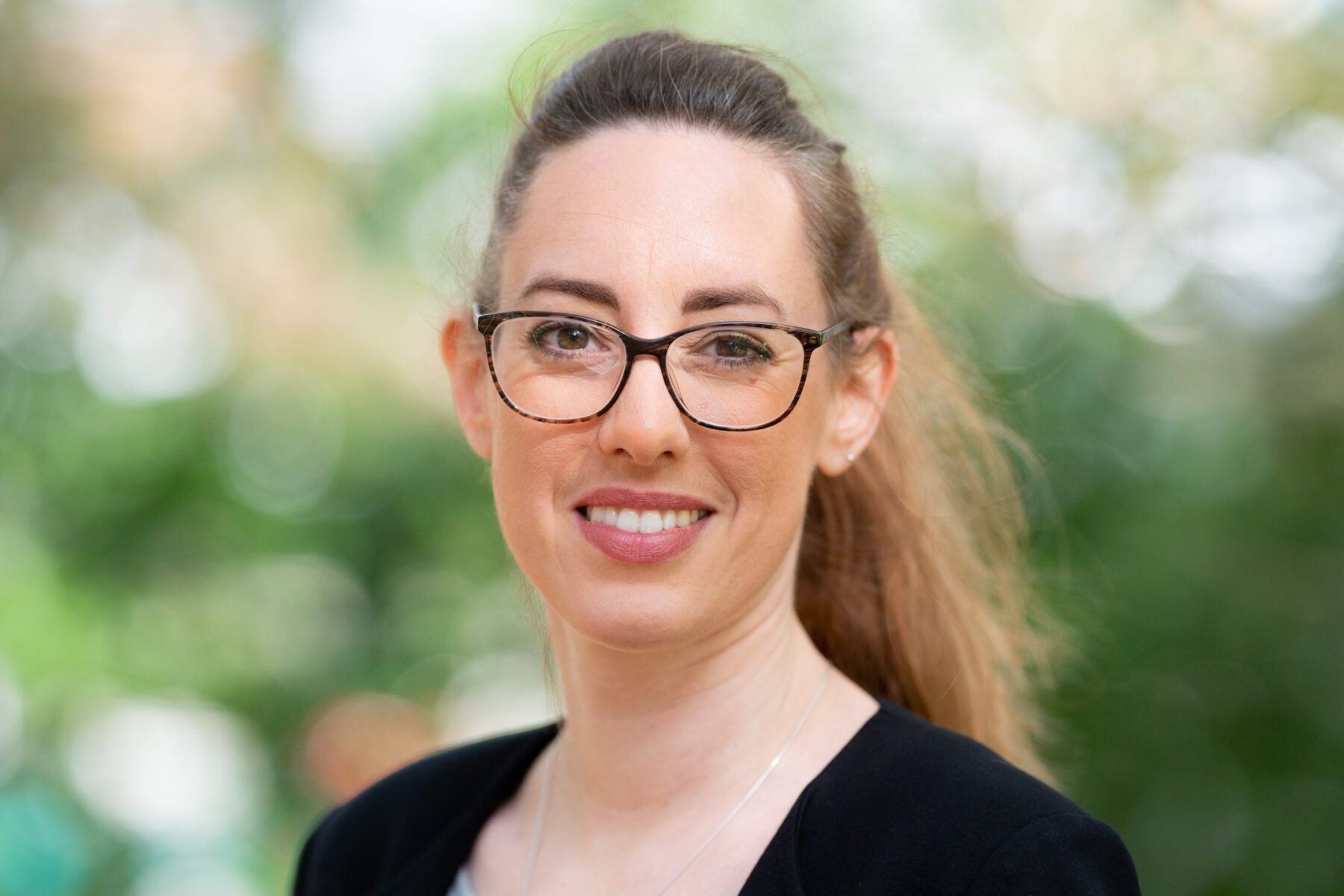
Extraordinary Careers at Potsdam Science Park – Yann Has Opted to Do a Voluntary Scientific Year (FJN) at Fraunhofer IZI-BB
You’ve just received your high school diploma – now what? While many young people go straight into further education after finishing school and others use the time to travel, some decide to take up volunteering. There is a wide range of options in this regard, the most well-known being the Voluntary Social Year. However, many don’t know that this is also an opportunity to get a taste of scientific research. Yann Niklas Klötzer is one of the people who have opted for a Voluntary Scientific Year (FJN) at Fraunhofer IZI-BB.
Choosing cell cultures over foreign cultures, the lab over the beach – just a moment ago, Yann was in the insitute’s cell culture, in full attire, of course. Before entering this special laboratory in protective clothing, he has to pass through a kind of airlock where he puts on a light-yellow gown – tied up at the front like a hospital gown – washes his hands thoroughly and then disinfects them, before putting on a pair of gloves. This is as few bacteria as possible should enter the cell culture laboratory at Fraunhofer Institute for Cell Therapy and Immunology, Branch Bioanalytics and Bioprocesses IZI-BB at the Potsdam Science Park, as they can distort the research findings.
Yann is proud and grateful that, at the age of just 18, he is able to come and go like a professional. His colleagues at the Fraunhofer Institute put a lot of trust in him. He only completed his high school diploma at Potsdam’s Helmholtz-Gymnasium this summer, and now he’s taking on a Voluntary Social Year in Science, Technology and Sustainability (FJN). This provides him with an amazing opportunity to try his hand at research and immerse himself in the scientific world.
Biology and chemistry have always been Yann’s favourite subjects
He has long been fascinated by the way biology and chemistry help us understand the world and everything that surrounds it. “For example: How do disinfectants fight bacteria? I’ve always been interested in questions like this”, he explains with shining eyes. Nevertheless, after finishing school Yann wasn’t sure whether he wanted to become a chemist or a biochemist. On top of that, the Covid restrictions at his school meant he rarely got to conduct experiments. Therefore, he thought it made sense to gain some practical experience to allow him to finally decide which career path to pursue. A friend then told him about the voluntary scientific year and he applied to Fraunhofer IZI-BB at the Potsdam Science Park.
Applying directly to the institute was rather unusual, as most people start by enquiring on the »Internationale Jugendgemeinschaftsdienste (ijgd)« website. There, one can register and then receive an email listing the available volunteering positions. The application is then carried out directly via the ijgd. However, Yann knew that at least some of the Fraunhofer Institutes in Berlin offer the FJN, but he was certain that he wanted to attend Fraunhofer IZI-BB in Potsdam because of the key research areas there. The initiative he showed clearly made a good impression, because the head of the institute, Dr. Ehrenteich-Förster, and the group leader Dr. Hettrich, who is now his supervisor, invited him for an interview. On 1 September 2022, he began his service as the first volunteer at Fraunhofer IZI-BB.
Yann especially enjoys the work atmosphere and the strong spirit of cooperation
The contract(s) regarding this service are concluded via the institute as well as the ijgd. The latter also governs Yann’s insurance status, holiday periods and a monthly allowance while he is employed at the institute. The FJN usually runs for exactly one year. The working hours are the same as those of the full-time employees on site, so usually 39 or 40 hours per week. In the past year, a total of 62 people have taken up volunteer service across Germany. It is a model project of the ijgd within the framework of the Voluntary Services Act. By way of contrast, 1768 people doing a Voluntary Social Year were advised by the ijgd over the past year.
As a result, Yann didn’t really know what to expect at his FNJ. Now his impression is all positive: “There’s a lovely atmosphere here”. He really appreciates the work atmosphere and the respectful, supportive cooperation at the institute, and arrives every morning with a smile on his face. A lot of the staff would do things like go for lunch together, and they were kind enough to include Yann in this from the very start.
Yann is allowed to get a taste of many working groups
Yann loves Potsdam Science Park and it is part of the reason why he is so happy in his position. “For one thing, I’m fascinated by the architecture of the buildings. I did an internship at the Max Planck Institute of Molecular Plant Physiology earlier and I stared at this kinetic installation for five minutes – it’s so beautiful.” From the Fraunhofer-Campus he now also gets to enjoy the view across the fields and the little details such as the bees in the grounds or the sheep who operate as »lawn mowers« in front of the institute building. He likes the whole concept of so many scientific institutes and facilities, including Potsdam University, being bundled together in the same place. ”Some employees of the Fraunhofer Institutes also go to the canteen at the Max Planck Institutes and engage in scientific discussion – that’s really nice.”
Many working groups here let him participate in their tasks. For example, he got a week-long introduction to a cell culture. “You get a cell line assigned to you and you have to feed it like a pet every other day, otherwise it will die. The cell is also given a mixture of amino acids, salts and vitamins so it gets everything it would need with a normal metabolism. To be able to conduct research on these living cells, you obviously need to keep them alive.” He’s allowed to move around most parts of the institute and look around various areas. On top of that, he already gets to “perform really cool tasks”.
From theory at school to practice in the lab
The experience of actually being in the lab here at the institute and putting the theoretical knowledge from school into practice made a significant impression on the young volunteer. Yann knows some people who have started scientific studies and wondered what the point was by the second semester because they didn’t have a goal in mind. “But because I’ve already witnessed the work that’s done here at the Fraunhofer Research Institute, I have an idea of what my future professional life could look like.”
He has also gained a lot of practical knowledge that will greatly help him in his studies. He can’t gain any credit for his future studies, but his practical experience will likely give Yann an advantage over his future fellow students. Yann also benefits from the many contacts he makes here with alumni who studied subjects that he shares an interest in. He also gets countless tips about his studies and various universities.
Yann already has a rough plan for the future: bachelor’s in Leipzig, master’s in Berlin
His experience at Potsdam Science Park has already led him to make two decisions that will set the way for the next few years of his life. He wants to start his bachelor’s degree at Leipzig University next year. You never know where your studies will take you, but Yann’s rough plan for the future is to complete his bachelor’s degree in Leipzig and then go on to do a master’s in biochemistry at FU Berlin, as it is a highly esteemed location for the subject. And who knows, with a little luck he might even get to write his master thesis at Fraunhofer IZI-BB – “that would be nice”, says Yann.
Today he’s decided to analyse the images he’s taken while microscoping and then later, Yann is attending another lecture on the subject of cell culture. He still has a few months left at Fraunhofer IZI-BB and a few study groups he’d like to attend. He’s already excited for what he’ll learn there.
This blog and the projects carried out by Standortmanagement Golm GmbH at Potsdam Science Park are funded by the European Regional Development Fund (ERDF) and the Federal State of Brandenburg.
Contact

Karen Esser
PR & Communications
karen.esser@potsdam-sciencepark.de + 49 331 237 351 103